Pick loquat in Ninghai, visit Qiantong Ancient Town, climb Lianghuang Mountain, and experience the "Ten Miles of Red Makings"
"Wanli Xiake Road, the first step in Ninghai", Ninghai, the beginning of "Xu Xiake's Travels", is located in eastern Zhejiang, in the middle of the coastline of the mainland of China, rich in tourism resources and beautiful environment.

Ninghai, literally divided, is a sea of tranquility. It is said that the East China Sea is full of rough waves, but the harbor here is calm, hence the name.

This trip will be in Ninghai for 2 days. The specific itinerary is as follows:
D1. Longquan Mountain Villa, Qiantong Ancient Town, and Jiumufang B & B in Suqiantong Ancient Town.
D2, Qiantong Ancient Town, Lianghuang Mountain, Shili Hongzhuang Cultural Park.

May every year is the season when white loquats are on the market. At this time, people's eyes are locked on a town in Ninghai County, the "Hometown of Loquats" in Zhejiang.
Zhejiang people's freedom of loquat depends on Ninghai.

As a popular fruit that is popular in summer, as soon as you enter a town, you will see fruit baskets full of loquats "occupied" on the road. Baskets of loquats are lined up. There are many people gathered around the fruit basket without shouting. Choose in front of the fruit basket.

On the mountain top, the white loquats all over the mountain are hung all over the branches. It is very tempting. With a quick pick, you can directly put the moist, sweet loquats into your mouth. You don't have to worry about pesticides at all. You can feel the sweetness in your mouth. It is also mixed with delicious flavor, and the whole person is moisturized.

There are still people in the world who stubbornly think that loquats are yellow, so they must not know the white loquats in Ninghai.
Ninghai white loquat, also known as "Ninghai white", is known as "Ninghai One Treasure". It has large fruits, thin skin, rich juice, high sugar, strong aroma, clear and sweet taste, neither sour nor astringent, completely breaking the past. The sour impression is worthy of being praised by experts in the loquat industry as "the best among loquat".
Whoever eats it knows, it is the favorite of Zhejiang people!

The most important thing is that the outer skin is very thin, and the whole piece can be peeled off with a gentle tug. No piece of flesh is wasted at all. With one bite, the sweet and tender flesh will spread out in the mouth, and the juice will be as much as an instant. Wrap the entire mouth, and it is so beautiful that you can catch people off guard.

As the "hometown of loquat" in Zhejiang, a town in Ninghai County had earlier cultivated this high-quality white sand loquat variety.
This is not only due to the hard research and development of scientific researchers, but also inseparable from the unique geographical location and warm and warm meteorological conditions of Ninghai on the coast of the East China Sea. In 2019, the Ministry of Agriculture and Rural Affairs awarded "Ninghai White Loquat" as a national agricultural product geographical indication product.

In order to maintain the original flavor, fruit farmers do not use pesticides, wax, and preservatives. Food safety is the bottom line of principle!
A town insists that loquat is grown to eat, not to see.

May is the busiest time in a town. More than 10,000 acres of mature white loquats must be picked in time. If it is delayed, the fruits will rot on the trees.

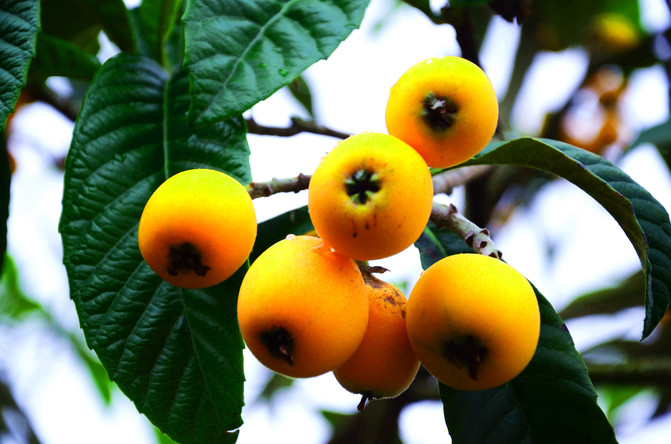
The fruit farmers have been busy since early morning. When picking, experienced fruit farmers will pinch the handle and put it away to retain the outer layer of small fluff.

The strange thing is that many loquat trees can't see loquat. Instead, there are light yellow paper bags on the branches. This is black technology. With this imported anti-bacterial paper bag, the fruits will not crack even in the sun, making the white loquat bright in color and not afraid of birds pecking.

The fruit farmers carefully sifted each loquat and neatly stacked it in the fruit basket.

We picked and ate, carrying a small basket when we left, and happily headed to the next stop: Qiantong Ancient Town.

[Qiantong Ancient Town, time has forgotten it and tourists have ignored it, but it is a dream without beauty]

If you want to experience life in an ancient town, don't go to those well-known ancient towns. Those places are too commercial and the people in the town are almost people who come from other places to do business. Now I recommend a niche ancient town to you. It is Qiantong Ancient Town in Ninghai County.

Compared with other ancient towns in Jiangnan water towns, Qian Tong is an alternative existence with an interesting name. Back then, there was a Hou Tong next to it, but later no longer exists.

Qiantong Ancient Town is located 14 kilometers southwest of Ninghai County. It has a large area of old houses and old streets from the Ming and Qing Dynasties. It has always been small and transparent until the performance of Chen Yifei's film "The Barber" was not known to the world.

In Jiangnan, there are differences. Compared with Zhouzhuang and Wuzhen, Qiantong is not very famous, and naturally has more cleanliness. In terms of scenery, Qiantong is more primitive and has almost no commercial amusement projects. It is very suitable for walking around. Take a look and take photos. China Post has issued a set of stamps on "Ancient Chinese Cities", the first of which is Qiantong Town.

Although there are many ancient towns in Jiangnan, there are still very few ancient towns with such fireworks. Qiantong Ancient Town has only one main street selling various specialties, and other streets and alleys are inhabited by local residents and are not harassed by the name of "scenic spot".

Walking on the street path is not a blue stone road, but a fine pebble. Putting your feet on it is like giving you a free foot massage.

The streets and alleys are narrow and the buildings are dense. Being in them is like entering a maze if you are not careful. To get out of the ancient town, you have to go against the current, because the stream in Qiantong Town flows to the town, which is different from the ancient city of Lijiang.

China's Eight Trigrams is an esoteric knowledge. The ancestors surnamed Tong laid out the buildings according to the word "Hui" and introduced the Baixi River into the town. A small canal circled the town, giving the ancient town more elegant and more spiritual. There is a rustling sound in front of every household, and the stream sings the story of the ancient town day and night. Although there are no cruise ships, residents have to cross bluestone slabs and bridges to enter their homes. It is not a water town, but a water town.

The ancient town looks a little dilapidated, revealing the beauty of vicissitudes, highlighting the beauty of reversing time and space, and allowing people to taste it in detail. The scenic spots include Zhisiqi Residence, Mingjing Hall, Folk Museum, Tong's Ancestral Hall, Qunfeng Yuanwu and "Hairdresser" The location where he was photographed. This is an officially recommended location, but in fact, the unlisted attractions are worth exploring.
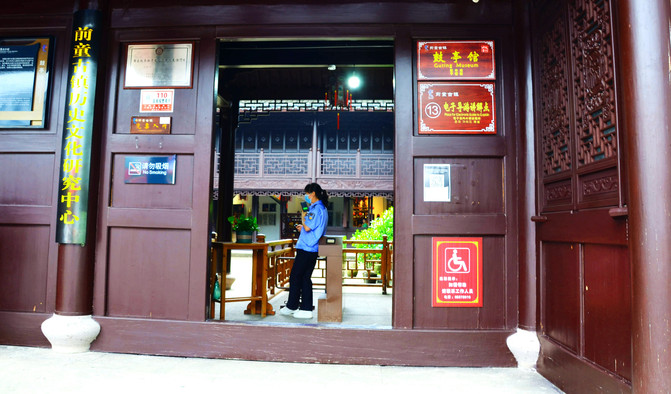
It is said that Qiantong's Lantern Festival Guild is a national intangible cultural heritage. It is one of the largest folk entertainment activities in the local area. From the 14th to the 16th of the first lunar month every year, the Tong people, regardless of age, go out from their homes and sing gongs in joy, carry drum pavilions, and release blaster flowers. The spectators from all over the surrounding villages arrive as scheduled, including Wuyang.

The Guting Pavilion displays drum pavilions, lifting pavilions, swings, etc. used during the Lantern Festival Guild parade. Most of them are original objects from the Ming and Qing Dynasties. Each object is a combination of carving, sculpture, painting, gold pasting, clay, lacquer and other craftsmanship.


There are many opera characters on the drum pavilion, with lights hanging high, like a golden dragon dancing wildly. I can only marvel at it.

On May 24, we took a photo in front of the Guting Hall to show that we had been here.

After leaving the Guting Hall, everyone took their luggage from the bus and headed to the Jiumufang B & B that was set up tonight.

Some people call Qiantong Town a "town on pebbles" because the walls are made of pebbles, and the open space of the courtyard houses is also paved with pebbles, not to mention the road surface. Pebbles are a terrorist existence in Qiantong Town. If you drag luggage, you should pay attention to the wheels at the bottom of the box when walking in the streets. Anyway, I am a backpack and secretly happy.

Passing by Zhengdetang, it is the original site of Qiantong Primary School. Zhengdetang is a place where clothes are cleaned, and the usage rate seems to be low. Basically, people are only here when there are official events. I am the only one in the 12-person group who entered.

Within a few steps, we reached Old Street, which was the commercial center of the ancient town. It was built in the late Qing Dynasty and was once prosperous for a while. Especially on the market day of the lunar calendar, merchants from the surrounding areas came in droves and the traffic was heavy. Now there are red lanterns hanging on the street. There are some shops and tea shops on both sides, but there are no Yiwu small commodities. The owners who opened the store are doing business one by one. There are no loud cries or soliciting sales on this street. Just as recorded in the "Ninghai County Annals", the former children and people" love their homes."Afraid of traveling far and not good at doing business," and Ningbo people, one of China's top ten business gangs, are two ways of life.

Write a stack of postcards at Qiantong Post Office and send them to those you miss them.
Rain dripped on the camera, but I didn't know if I had drunk too much.

At the end of the old street is a courtyard house: Tong's Ancestral Hall.
The ancestral temple was built in the 18th year of Hongwu of the Ming Dynasty. It was designed by Fang Xiaoru, a great scholar of the Ming Dynasty. Fang Xiaoru was from Ninghai and once assisted Emperor Jianwen. Later, his uncle Zhu Di rebelled and usurped the throne and asked Fang Xiaoru to draft an edict for usurping the throne. If he did not obey, he would destroy his nine clans. Fang Xiaoru, who was not a traitor, replied very firmly: "So what if the ten clans were ten clans?" This tenth clan was his disciples.
Zhu Di dared to destroy the emperor, let alone your little Fang Xiaoru. If you didn't write, others would come and write, so he executed Fang Xiaoru. In addition to him, 870 people lost their lives.
Alas, it's just writing a notice against your will. Is it so difficult for you to write a few lines? Why did you trap so many innocent people?

Fortunately, the courtyard house he designed was not implicated, retaining the main entrance, stage, patio, east and west wing rooms and main hall. The large stage inside is now occupied by amateur fans.

There are 32 large columns in the hall, which are like the 32 chess pieces in chess, implying the meaning of a game of chess for the whole family.

There are many wells in the town, and in ancient times, residents relied on them for drinking water. Looking closer and looking down, it was not a dry well, but a living well with water.

Many ancient wells and the Bagua water system form an interesting "well water does not interfere with river water". When the lights are turned on, the wells of the ancient wells look like they are plated with gold, which attracts the eyes.

I ran into Yifei Cinema directly while traveling. I was not mentally prepared at all. I was so surprised. It is now one of the most popular check-in spots for tourists.

This was the main location where Chen Yifei, a painter and director living in the United States, filmed "The Barber". There must be a reason why he chose this location to film. If he had time and interest, he would go in and watch a scene of "The Barber" starring Chen Kun and Zeng Li, and recall the scenes in the play. Chen Kun wiped the neck of a Japanese man here.

After stopping and walking, we arrived at the store where we stayed that night. The house looked old, but the heart was full of flowers. I found that it was rebuilt on the old house to make it more comfortable for tourists, but ordinary people couldn't tell. It's very tiring chatting with the landlord, and neither of them can speak Mandarin.

In order to take care of the business, everyone divided up, so half of the team was arranged to live in the Qiantong Post Inn next door.

After settling in, I started shopping. Without the shackles of luggage, I felt relaxed. The town is very old and feels like an ancient town in Lijiang, but it is far simpler than Lijiang. Qiantong is not as noisy as Zhouzhuang, nor is it the operating model of Wuzhen that empties residents. This is not like a scenic spot, but like the ancient town where my grandfather lived. It is used for nostalgia. Most people with feelings will fall in love with this ancient town.

Nowadays, the city is getting bigger and bigger, but the homes are getting smaller and smaller. One-stop bungalows have been demolished and replaced by high-rise buildings. Residents 'homes are no longer on the ground. This modernization process, which is changing and growing, is increasingly devouring traditional historical buildings.

The alleys are as dense as a spider's web, and it is difficult to figure out the direction when walking in them. Without realizing it, you will be lost in the latitude of time and space.

I passed by the Wedding Silver Museum, but unfortunately it closed the door.


Qiantong's accommodation is not everywhere as in Xitang, but some inns are also moderately opened, most of which are low-key in the depths of the alleys. Some follow the ancient style and some follow the literary style.


Green vines, white walls and black tiles, carved windows with stone, carved beams and painted buildings and gate buildings, showing the prosperity of the past in the desolation.

The former children were vicissitudes, haggard and peaceful, and some streets and alleys were empty. Was it an empty city?

The alleys are deep and deep, without the intrusion of tourists, the years are quiet, and the residents of the town live their little lives open-minded and leisurely. Sending this kind of photo to your circle of friends immediately attracted doubts: "Why is it so deserted?" It seems that everyone is used to looking at heads in tourist attractions. If they don't see them, they will feel weird.

As early as 2006, they raised red koi, carp, etc. in the stream. None of the residents went fishing. Instead, they spontaneously raised some fish fry. The picture of fish swimming in groups became a unique scenery in the ancient town.

Walking to the main entrance of the ancient town, diagonally opposite is Lushan. This mountain is the best place to see the panoramic view of the ancient town. It has a good view from it and you can take the entire view of the ancient town.
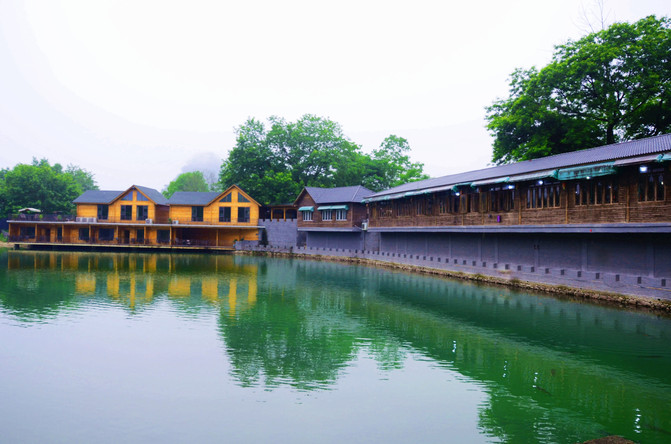
At the main entrance of the ancient town, we took a bus to Zizhuyuan Farm, 8 kilometers away, for dinner. The external environment of the farm is very good. It is located at the foot of the mountain, and Baixi also flows through it. By the way, we have eaten very satisfied meals these two days, and we have eaten all Ninghai's specialties.


Eating in the town at night, each old house retains the last breath of Jiangnan in the past. Pushing open the wooden door, time poured out among the bricks and tiles, slowly entering the dream with ancient stories that spanned thousands of years.

The next morning, I walked around while carrying my luggage, and continued to look at what I hadn't seen the day before.

When I first heard "Qunfeng hairpin Wat", I thought it was a few mountains, but I didn't expect it to be a small courtyard hidden in a narrow alley.
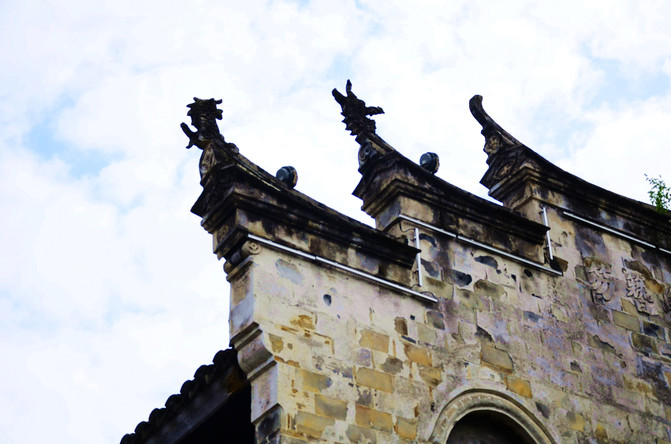
I asked the tour guide what the "Qunfeng hairpin Wat" was. She raised her hand and pointed upwards. It turned out that the Qunfeng hairpin Wat pointed to the corner of the house, which was beyond my imagination.
Hairpin Wat, which means crown hairpin and handmade, is something used by ancient officials.

The Qunfeng Dianhu was built during the Qianlong period of the Qing Dynasty. The owner was Tong Guilin, a member of the Qing Dynasty. He was once the deputy director of the Xiling Seal Society, but the ending was tragic.
Standing in the center of the courtyard, I seemed to hear him complaining of injustice.

Architecture during the Ming and Qing Dynasties reached a peak, paying attention to neatness, rigor and elegance. Most of the use of blue-gray brick walls and tiles topped the roof, highlighting the combination of beams, columns and purlins, and had a greater architectural space effect. Most of the beams and windows were made of natural wood, which was full of human interest. Masonry was also used in large quantities in Qing Dynasty buildings, which promoted the development of masonry structures.

If you are tired from walking, please don't let go of the delicious food in the ancient town. Some locals set up stalls on the roadside, and some even hung the certificates they won. When passing by, the boss enthusiastically invited us to try it for free. You can try the "Qian Tong Three Treasures"(Qian Tong tofu, Qian Tong fragrant dried, Qian Tong hollow rot). It is extremely delicious and you can try it until you are full.

Although Changsha stinky tofu is very popular and although everyone calls it tofu, the former child has his own trick. In addition, soup dumplings, wheat paste head, wheat cakes, sesame rice, etc. also have unique flavors, and the prices are not expensive.
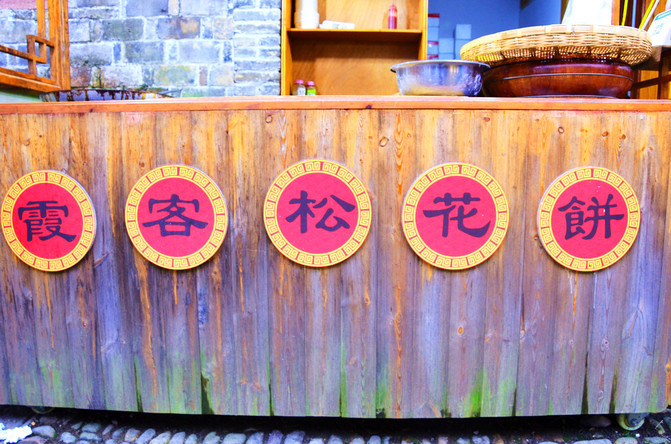
In front of the child, there are also Xiake Songhua Cakes brushed with a sense of presence. It is said that when Xu Xiake came to Qiantong, the people took out wheat cakes to entertain him. The wheat cakes were thick and cared for not being full but not caring for the aroma. As a traveler and gourmand, Mr. Xu guided the people to roll out the cake crust thin and then thin. After being baked, it really tasted fragrant, and it has since become a special snack for former children.

Xiake Songhua Cake, the main ingredients for making are flour and songhua. It has a lingering fragrance in the mouth. A taste can open up the Ren and Du veins.

Walking around casually, you will always find different scenery. One end is reality and the other is Ming and Qing Dynasties.

Qiantong Ancient Town was shouted away before he could enjoy visiting it.

[Liang Xuandi has been here, Xu Xiake has been here, who will come next?]

Lianghuang Mountain is a famous mountain in eastern Zhejiang, with steep mountains and floods.
What makes it famous is not because of its appearance, but because of one person, Emperor Xuan of Liang.

It is said that during the Northern and Southern Dynasties, Emperor Xuan of Liang was just a vassal. His official name and position were Xiao Cha, King of Yueyang. He was involved in Hou Jing's rebellion. In order to save his life, he hurriedly hid in a deep mountain in Ninghai County and lived in seclusion here. Later, when the time was ripe, he went out of the mountain and got an emperor to practice his skills. Later generations named this nameless mountain Lianghuang Mountain.

A few years after Emperor Xuan of Liang left this mountain, the travel master Xiao Xu followed him. He did not hide here in panic and fear like Emperor Xuan of Liang, but sang loudly about this mountain and wrote it in "Xu Xiake's Travels", which is still the beginning of the book.

On May 25, we entered Lianghuang Mountain. The first attraction was Shangma Stone, known as the "No. 1 Stone in Jiangnan". In 584 AD, Xiao Cha, King of Yueyang, who had escaped the limelight, stepped on this stone and rode out of the mountain. Later, he became the founding emperor of Xiliang.
In 1613, Xu Xiake, the ancestor of his donkey friend, rode to Lianghuang Mountain. After learning this story, he also followed the example of the Liang Emperor who stepped on stones and mounted horses. From this point of view, this "No. 1 stone in Jiangnan" takes two allusions: "Founding of the People's Republic" and "Opening", which is of high value.

I chose the road on the right side, and I arrived at Wisteria Language. In summer, I walked down here and said goodbye to the ultraviolet light.

On the way, I encountered a miniature temple holding Guanyin Bodhisattva. Most tourists passing by did not stop here, so don't bully the temple. At that time, King Xiao Cha of Yueyang led his troops back to Beijing under the inspiration of this Guanyin to quell the war and become emperor.

Walking straight up, I began to hear the sound of the stream crashing. There is a huge stone in the water, named: Stone to Run. The color is very good, but the characteristics of the stone are not obvious.

When I came to the "Heart Washing Pond", I saw clear clear water and washed away the dust even more. It is said that the scholars of Gongtai Academy were instructed by the old monk and came here to wash their hearts in the pond. Their ten fingers were connected to each other. They washed their hands and washed their hearts. They immediately took the exam again and became the top scorer in high school.
I also came to wash my hands.

Several young friends began to rest when they arrived at the Yanxia Pavilion, but the older ones of us were still full of energy.

The scenic area has abundant water and many waterfalls. The picture above shows a three-line waterfall, with silver flowers flying, water droplets splashing jade, and mist filling the air.

Along the way, dozens of waterfalls, large and small, fly down from the mountain walls and rocks. The "Seven Fairy Flying Waterfalls" are like seven fairies descending to the earth. When they see the waterfalls dancing, they all have graceful and elegant figures.

Climbing halfway up the mountain, there is a flying magic carpet set up here, which rises at a uniform speed and is very stable, sending you up the mountain easily. It is a good news for lazy people.

After getting off the flying magic carpet, I came to Xinxin Lake. When I get here, I should just drop all matters such as contract negotiations and professional title competition. Oxygen inhalation is the serious matter.

If you want to last forever, come here to take a photo. The highlight of "Lovers Waterfall" is the stone between the two waterfalls. The interesting point of this stone is the shape of the "heart".
Dog abuse.
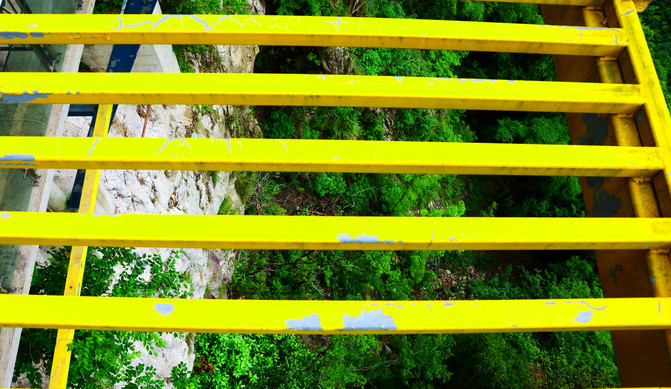
The tense and exciting projects are here. What is placed in front of us is a "high-altitude walk". The steel bars laid under our feet are leaking. Don't look at your feet, otherwise you will be so scared that your legs will not know how to move forward.

There is a project like this in the location corresponding to high-altitude walking. Look, there are no guardrails. This is simply an attempt to deliberately murder tourists. Fulong, I can't name the project. Fortunately, it's a rainy season and it's temporarily closed.


Connected to them is a glass bridge, which spans the sky like a white belt.

The glass bridge is a popular attraction. It had just rained. When the staff saw tourists coming, they hurriedly used mops to clear the stagnant water on the bridge deck.

The glass bridge is more than 60 floors high from the ground. People walk in the bridge and clouds float around us. This is the place where we stay the longest.

A special observation platform extending outward is set up in the middle of the bridge, which is in a semicircle shape, which is convenient for tourists to view and take photos.

I hate the fact that scenic spots create a 5D effect on the glass bridge to keep up with the trend. This is purely a gimmick. Fortunately, Liang Huangshan has his own determination.

After crossing the glass bridge, something more terrifying is waiting for you. Cliff swing is a game of death. Anyway, I cherish life.

The scenic area does not call this a cliff swing, but an adventure park.

It is said that the sky in Chaka Salt Lake is dreamy, but I don't know that the sky in Lianghuang Mountain is not inferior to that in Lianghuang Mountain. The Chaka is on the lake, and the sky here is in the sky.

The sky on the top of the mountain is closer to the sky, and it deserves its name. It has become a place for Internet celebrities to check in. Women love it.

We are here to experience the magical magic brought by the mirror. It is really a demon mirror.

After filming the person sitting in the hanging chair, then changing the chair, and the film was the same.

The consequences of this kind of check-in photo being posted on the circle of friends are very serious, and it is completely to arouse hatred.

If you want to pursue a blockbuster, it is necessary for a beautiful woman to take off her shoes and socks.

Stepping barefoot on the cold mirror, this spirit of hard work deeply moved me.

If you don't take off your shoes, the beauty of the picture will be greatly reduced. Don't disobey me.

Plastic sisters, get it done.

There is a glass slide down the mountain, which can quickly take tourists to the foot of the mountain without having to be so tired on foot. When riding on the slide, pay attention to maintaining a certain distance to avoid rear-end collisions. Butterfiy disliked me for skating slowly, so she used her feet to jam her sides from time to time to brake.

After reaching the ground, there was still a mountain road to travel, and soon I saw a scene ahead, called Yougu Tingquan.

Hearing that the Emperor of Liang was going to come out of the mountain, the golden toad ran over to present his treasure. This gave rise to the scene of "golden toad presenting his treasure". No wonder Xu Xiake praised back then: The peaks are glorious and the rivers are connected, and the trees are beautiful and the stones are strange.

After getting down the mountain, we rushed back to Ninghai County without stopping, where there was a prosperous scenic spot.

[Walking into Shili Hongzhuang Cultural Park and seeing how Ninghai County married a daughter in ancient times]

How much does it cost to marry a wife in Ninghai, Zhejiang?
Don't need money, you can still earn it! Let you save 20 years of struggle!
You heard correctly. In Ninghai County, it is the opposite of the current phenomenon of "unable to afford to marry". In ancient times, women could not afford to marry.

Since the Song Dynasty, Ninghai has had the custom of marrying well, which is often referred to as "ten miles of red makeup".
"Shili Hongzhuang" is a semi-exaggerated and semi-realistic adjective, which refers to the very rich dowry. The dowry is painted with red lacquer and shines brightly. The beds, tables, utensils, boxes, cages and bedding are all available, and everything you need for daily life is included. On the day of marriage, the road is opened by bars and boxes, and the sedan chair is in the center. Boxes, cabinets, tables, chairs, buckets, basins and other red-painted dowry supplies are followed to show off the wealth of the woman's family property in a high-profile manner.

The wedding team was huge, like a golden dragon in a red robe. The first time it carried the dowry into the man's house, and the last time it might still be in the woman's house. It stretched for ten miles. Along the way, gongs and drums sounded at the same time, and firecrackers were constantly heard. I went to the man's house happily, so I was called the "Ten Miles Red Mausoleum".

It is said that the custom of red makeup in Shili East Zhejiang originated in the Song Dynasty and was related to Song Gaozong. One day, Zhao Gou, who had not yet become emperor, fled to Ninghai, Zhejiang. When he was dying, he was rescued by a beautiful village girl. Zhao Gou was moved to tears. He knelt down and made a promise that if he could ascend the throne and become emperor, he would definitely come and marry the village girl.
As the emperor and queen, Zhao Gou did not break his promise and came to marry the village girl, but the village girl was unwilling to marry into the palace. To this end, he used a unique trick. All the girls in the village were covered with red turbans, so that Zhao Gou could not distinguish which of the village girls he was looking for. In desperation, he had no choice but to issue an edict: "All women in eastern Zhejiang will be granted kings" and that they could enjoy the treatment of a semi-royal carriage when they got married.

Although the wedding custom of Shili Hongzhuang no longer exists, there is still one place in Ninghai where we can reminisce and feel. It is Shili Hongzhuang Cultural Park, which is the largest wedding custom cultural park in Zhejiang Province.

Shili Hongzhuang Cultural Park uses bamboo, wood, stone, soil and metal as the main building materials, coupled with the inherent landscape garden elements in Jiangnan, which is in line with Ninghai's artistic conception of "people's hearts, mountains and lights, and flexible mountains and rivers". It is indeed a work by Wang Shu, winner of the Pritzker Architecture Award.

There are 10 exhibition halls in Shili Hongzhuang Cultural Park, collecting more than 2000 pieces of red makeup collections of various types such as sedan chairs, beds, cabinets, tables and chairs, and combs, recreating people's longing for a better married life.

The most conspicuous one should be the "Wangong sedan chair". You can feel how complex its process is from the name. The Wangong sedan chair is made of wood, and its exquisite feature is that no nail is used. There are 400 statues on the sedan chair, as well as countless flowers, plants, birds and insects. It is said that making such a sedan chair requires the collaboration of multiple people and takes 10,000 man-hours. The Wangong sedan chair was once listed in "National Treasure".
Looking around, a beautiful child is like a miniature palace. How happy is the bride sitting in it?
Previous Article:Fancy celebrating June 1st, having a carnival with the animals in Younger, Ningbo
Next Article:Find a B & D in Xiangshan, Ningbo. People live in the tidal smoke, and the sound of the waves reaches the pillow
